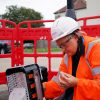Ofcom UK Unveil Autumn Pilot for White Space Wireless Broadband Tech
Ofcom has today called upon the UK telecoms industry to take part in its forthcoming autumn 2013 pilot of White Space (IEEE 802.22) wireless broadband technology, which harnesses the unused radio spectrum that exists between Digital Terrestrial TV channels to deliver wifi style connectivity over a wide area.
The communications regulator, which is currently developing a new framework to support the use of white space services and devices on a licence exempt basis (here), confirmed that the new pilot would focus on testing the “inter-operation of white spaces devices, white space databases and the processes to mitigate against causing any undue interference to current spectrum users“.
Advertisement
Ed Richards, Ofcoms CEO, said:
“Ofcom is preparing for a future where consumers’ demand for data services will experience huge growth. This will be fuelled by smartphones, tablets and other new wireless applications.
White space technology is one creative way that this demand can be met. We are aiming to facilitate this important innovation by working closely with industry.”
However it’s certainly not the first time that white space tech has been tested in the United Kingdom. BT, Microsoft, Neul and various other operators have all conducted white space trials at various locations around the country (e.g. Cambridge, Cornwall and the Isle of Bute), often with mixed success, yet so far none have made a clear commitment to pursue the technology.
Concerns over costs, performance (remember it’s only first generation kit) and feasibility are often seen as potential stumbling blocks. Never the less the University of Strathclyde, with funding from the Scottish Funding Council, recently opened a new Centre for White Space Communications that aims to help develop the technology (here).
Ofcom claims that the solution could, assuming the pilot is successful, be “fully rolled out during 2014“. But it remains to be seen if anybody, beyond a few niche rural deployments, will want to make more significant use of it.
Mark is a professional technology writer, IT consultant and computer engineer from Dorset (England), he also founded ISPreview in 1999 and enjoys analysing the latest telecoms and broadband developments. Find me on X (Twitter), Mastodon, Facebook, BlueSky, Threads.net and Linkedin.
« UPD BT Sign £24m BDUK Deal to Boost Superfast Broadband in Durham UK


















































Comments are closed